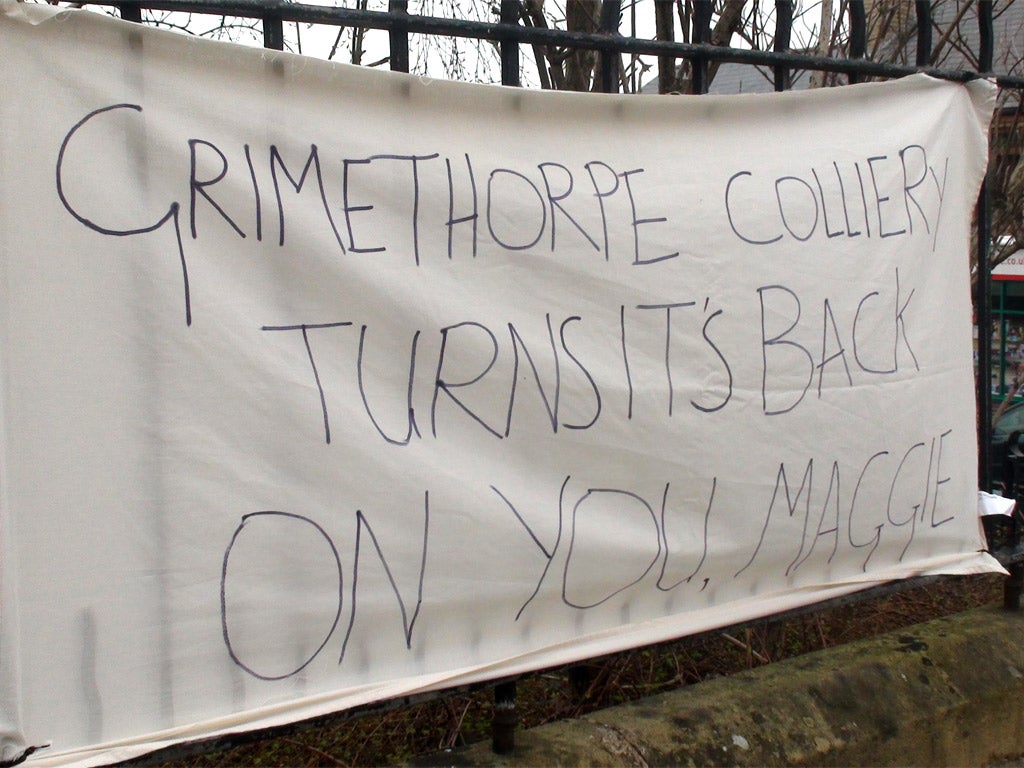'Rust in peace': Former mining village Grimethorpe bids final farewell to Margaret Thatcher as effigy is hanged

Hanged, paraded, punched and spat on before finally being set alight – cheered on by the jeering crowd.
These were the final moments of an effigy of Baroness Thatcher yesterday as three decades of anger and hurt spilled over during a mock funeral in the heart of the former coalfield communities for whom she will forever be a reviled figure.
Up to 1,000 former miners and locals marched behind the image of the late Tory leader as she was taken in a procession behind a horse- drawn carriage in the former South Yorkshire pit village of Goldthorpe.
Rob Shaw, 53, spent a year and a day on strike. A veteran of the Battle of Orgreave, he conceded outsiders might find it hard to understand what was happening here. “She was horrid. If you are from down South you won’t understand the feeling in the community at what she has done to us,” he said, as the mannequin was taken to derelict land behind a pub and ceremonially torched.
Only yards away from the pyre on the site of the old colliery is a new housing estate. It was here during the 1984-5 strike that two teenage boys died when an embankment collapsed on them as they were out collecting coal to raise pocket money. They are memories which have never been erased.
For much of the day drinkers were spilling out of the pubs and a festival atmosphere prevailed. Old and young came out to say their unfond farewells beneath the watchful eye of a police helicopter and a handful of officers on the ground who appeared to be letting them get on with it.
The piped procession followed the same route, behind the same union banners, as it did at the end of the 1984-5 strike and again when the pit finally closed in 1994.
The Thatcher effigy spent the morning strung up in a noose outside the Union Jack social club. Flowers on her coffin spelt the word “scab” while references to Jimmy Savile were scrawled on the fake wood.
Jane Armstrong, 39, was brandishing a “Coal not Dole” placard. “ I used to go the soup kitchen with my dad during the strike when I was 10 years old,” she recalled. “But this won’t be the end of it. It might be 30 years but the Conservatives are still in power and people will always remember. We will never forget,” she said.
John Bywater, 68, was watching events unfold from outside the Rusty Dudley pub but was not getting involved. “From Scotland downwards they all hate her. Last time we had this many people in the street it was the end of the strike when everyone went back to work,” he said.
“They have been waiting for her to die for years.”
Further down the valley in Grimethorpe the mood was less militant. Arrivals in the village were greeted with the sign “No tears for Thatcher”. At the locked gates of the abandoned colliery another draped over the old winding wheel read: “Thatcher died naturally but she murdered our pit.”
Inside Grimethorpe Working Men’s Club – once the thriving hub of village social life – there was an equally solemn mood.
Locals had been invited to enjoy a free buffet and “raise a glass to the Iron Lady that she may rust in peace”. By the time the television showed the gun carriage rolling towards St Paul’s Cathedral, however, just a handful of drinkers had turned up and none were particularly interested in watching proceedings unfold in London.
“Cameron wants to be in the next chariot – all that money for this,” observed Terry Tindale, 69, who suffers from pneumoconiosis after spending 26 years of his working life down “Grimey”, which at its height was one of the most technologically advanced deep pits in Europe, employing 6,000 men. “They should have put her in a field and let her rot,” he adds.
Jim Sellars, 53, spent 15 years down the mine and turned up yesterday dressed in his old pit clothes to have a drink and remember his father, who also worked underground.
“I think it is disgusting. We have to pay for our funerals so why doesn’t she have to pay for hers? I think the protests are brilliant,” he said.
Glen Butterworth, 54, had hoped to work alongside his sons down the pit where his father was also employed. Now he drives a bus.
“We are all happy that she has gone. There was a lot of hardship here. She has killed more people than Saddam Hussein and Osama bin Laden put together through poverty and families are still paying for it to this present day,” he said.
Subscribe to Independent Premium to bookmark this article
Want to bookmark your favourite articles and stories to read or reference later? Start your Independent Premium subscription today.

Join our commenting forum
Join thought-provoking conversations, follow other Independent readers and see their replies